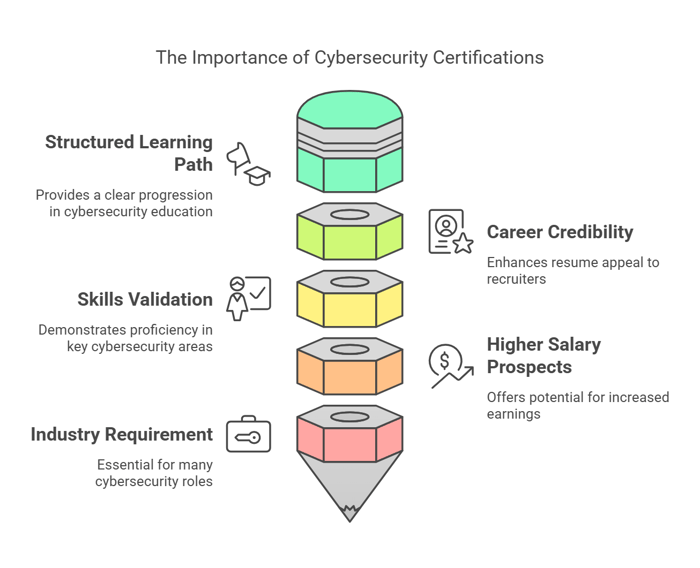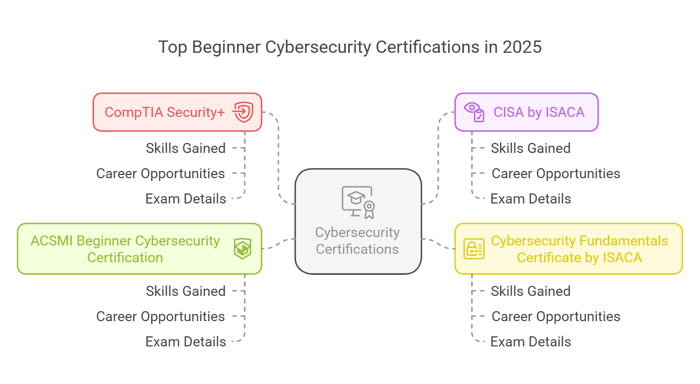Table of Contents
The demand for cybersecurity professionals continues to surge as organizations battle the increasing threat of cyberattacks. With 2025 expected to witness a 30% rise in cybercrime costs worldwide, cybersecurity has become a critical industry with immense career opportunities.
One of the best ways to enter this field is by earning a beginner cybersecurity certification. Whether you have prior IT experience or are starting from scratch, Cybersecurity Certification Without Experience provides structured learning, skill validation, and career-ready expertise to help you succeed.
This guide will explore the most relevant beginner cybersecurity certifications, discuss the latest industry trends in 2025, and help you choose the right certification to launch your career.
Why Beginner Cybersecurity Certifications Matter in 2025
Cybersecurity certifications are stepping stones to success, which can prove your knowledge and help to attract employers' attention. Cyber threats are increasing, and therefore companies require people who can manage risks, protect data, and understand compliance frameworks.

Reasons to Pursue a Cybersecurity Certification:
Structured Learning Path: Provides a clear and well-defined learning process that takes you from basic to advanced cybersecurity concepts.
Career Credibility: Showcases your knowledge and expertise, making your resume more appealing to recruiters and hiring managers.
Skills Validation: Demonstrates proficiency in essential areas such as ethical hacking, risk assessment, and network security.
Higher Salary Prospects: Certified professionals typically earn more than their non-certified counterparts, with potential salary increases of up to 20%.
Industry Requirement: Many cybersecurity roles explicitly require certifications, making them essential for career advancement.
The 2025 Cybersecurity Job Market: A Snapshot
Job Openings: The cybersecurity workforce gap is projected to reach 3.5 million unfilled positions globally.
Growth Areas: In-demand fields include cloud security, AI-driven cybersecurity solutions, and digital forensics.
Salary Trends: Entry-level cybersecurity analysts earn an average of $72,000 per year, with mid-level professionals earning significantly more.
Real-World Impact of Certifications
Having certifications does help to gain an edge in job applications. For example, a candidate with Security+ certification will probably be more desirable than an applicant without certification when applying for a SOC Analyst position since it proves that they know the basics of cybersecurity.
Top Beginner Cybersecurity Certifications in 2025

1. CompTIA Security+
Why It Stands Out:
Recognized globally as an excellent entry-level cybersecurity certification.
Provides a mix of theoretical knowledge and hands-on skills.
Skills You’ll Gain:
Learn the fundamentals of network security, threat management, and cryptography.
Develop skills in identifying, analyzing, and mitigating security threats.
Understand access control, security monitoring, and risk management strategies.
Career Opportunities:
Entry-Level Roles: Security Analyst, IT Support Technician, Tier-1 SOC Analyst.
Mid-Level Growth: Cybersecurity Engineer, Penetration Tester.
Exam Details:
Cost: $392
Format: 90 multiple-choice and performance-based questions.
Duration: 90 minutes.
2. Certified Information Systems Auditor (CISA) by ISACA
Why It Stands Out:
Best suited for those interested in auditing, IT governance, and compliance roles.
Globally recognized and widely accepted by regulatory organizations.
Skills You’ll Gain:
Learn how to audit IT systems to detect security vulnerabilities.
Gain expertise in compliance frameworks such as GDPR, NIST, and ISO 27001.
Understand business continuity planning and enterprise risk management.
Career Opportunities:
Entry-Level Roles: IT Auditor, Risk Consultant, Compliance Analyst.
Mid-Level Growth: Chief Information Security Officer (CISO), Security Operations Manager.
Exam Details:
Cost: $575 (ISACA Members) / $760 (Non-members)
Format: 150 multiple-choice questions.
Duration: 4 hours.
3. Cybersecurity Fundamentals Certificate by ISACA
Why It Stands Out:
An excellent introductory certification for individuals new to cybersecurity.
Covers essential security principles in an easy-to-digest format.
Skills You’ll Gain:
Recognizing and preventing common cyber threats such as phishing and malware.
Implementing security best practices in small business and corporate environments.
Understanding frameworks like ISO 27001 for data security and governance.
Career Opportunities:
Entry-Level Roles: Security Awareness Trainer, IT Security Assistant.
Mid-Level Growth: Cybersecurity Consultant, Security Administrator.
Exam Details:
Cost: $150
Format: 75 multiple-choice questions.
Duration: 2 hours.
4. ACSMI Beginner Cybersecurity Certification
Why It Stands Out:
Offers a unique 400+ module certification focused on hands-on training.
Designed to build job-ready cybersecurity skills with real-world simulations.
Skills You’ll Gain:
Learn how to conduct vulnerability assessments and risk mitigation strategies.
Develop expertise in file encryption, cloud security, and IoT security frameworks.
Understand advanced concepts like zero-trust architecture and penetration testing.
Career Opportunities:
Entry-Level Roles: SOC Analyst, Cybersecurity Support Technician.
Mid-Level Growth: Threat Intelligence Researcher, Forensic Investigator.
Exam Details:
Cost: Flexible pricing based on modules chosen.
Final Thoughts
A beginner cybersecurity certification is your gateway to a high-paying and rewarding career in one of the fastest-growing industries. By selecting the right certification, gaining hands-on experience, and staying updated on 2025 cybersecurity trends, you can successfully build a future in cybersecurity. ACSMi provides the guidance and resources you need to get started. Ready to get certified? Start your cybersecurity training today with ACSMi and take the first step toward an in-demand career!
FAQs on Beginner Cybersecurity Certifications
1. Are beginner cybersecurity certifications worth it?
Yes! Certifications validate your skills and improve your chances of securing a cybersecurity job. They also provide structured learning and industry recognition.
2. How long does it take to complete a cybersecurity certification?
Most certifications take 2-3 months with regular study. More extensive programs, like ACSMI’s 400+ module certification, may take 6-12 months.
3. Which certification is best for cybersecurity beginners?
CompTIA Security+ is widely recommended, but ACSMI offers strong hands-on learning.
4. Do cybersecurity certifications guarantee a job?
While they improve job prospects, practical experience and networking are also important factors in securing employment.
5. How much do cybersecurity certifications cost?
Prices range from $150 to $760 depending on the provider and certification level.
6. Can I get a cybersecurity job without experience?
Yes, many companies consider certifications as proof of knowledge, even for beginners.
7. Is hands-on experience important for cybersecurity careers?
Absolutely! Certifications with practical labs, such as ACSMI, provide valuable real-world training.
8. What’s the future of cybersecurity careers in 2025?
The industry is growing rapidly, with increasing demand for cloud security, AI-driven security solutions, and compliance expertise.





